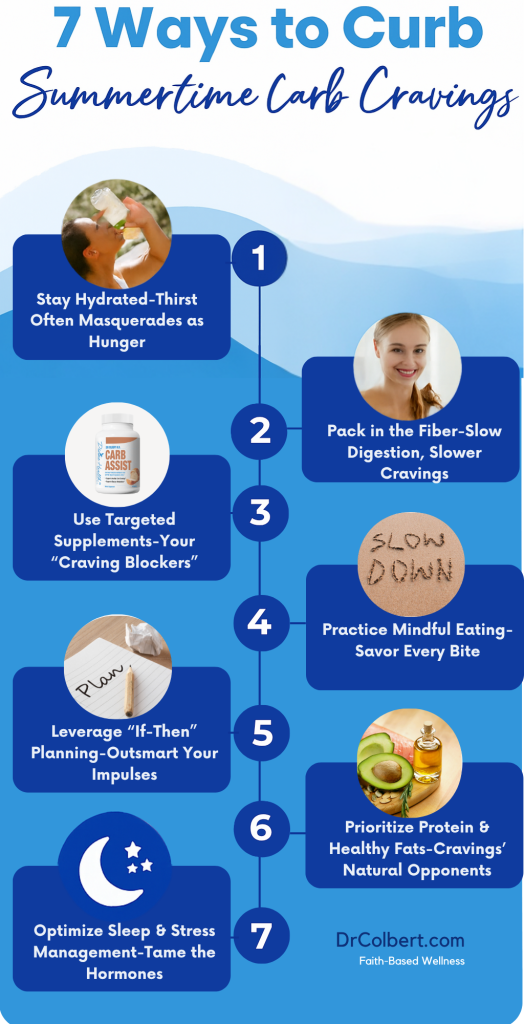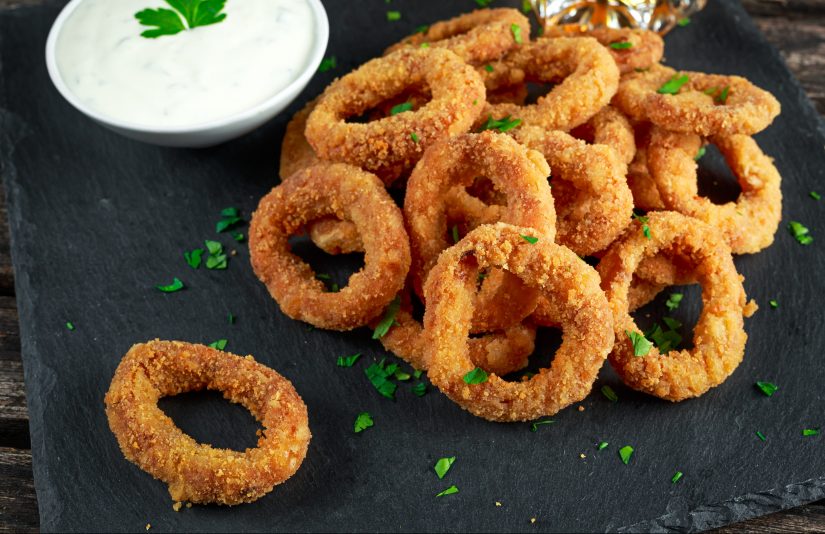As the mercury climbs, so too can our hankering for cold beers, sugary smoothies, and carb-heavy treats. Left unchecked, these cravings can derail even the best intentions. Fortunately, research offers clear, practical tactics to keep those impulses in check—so you can enjoy the season without sacrificing your health. Below, you’ll find seven science-backed strategies (and real-world stats) to help you stay on track all summer long.
1. Stay Hydrated-Thirst Often Masquerades as Hunger
Why it works: Dehydration blunts your satiety signals, making you more likely to reach for quick-energy carbs. A landmark study from the University of Birmingham found that drinking 500 mL of water 30 minutes before a meal led participants to consume 75–90 fewer calories, on average, compared to those who drank no water beforehand (Stookey et al., 2012).
Dr. Colbert’s tip: Keep a tall glass or reusable bottle by your side. Aim for 8–10 cups of water daily—and chug 8 oz before each meal. On hot days, mineral-rich sparkling water or herbal iced teas count, too.
2. Pack in the Fiber-Slow Digestion, Slower Cravings
Why it works: Fiber not only bulks up your meals but also slows carbohydrate absorption, flattening blood sugar spikes that trigger rebound cravings. A meta-analysis in the Journal of Nutrition showed that for every additional 10 g of fiber consumed daily, people eat 130 fewer calories overall (Clark & Slavin, 2013).
Dr. Colbert’s tip: Reach for fresh berries, peaches with skin, chilled edamame, or a big mixed-green salad topped with chickpeas or black beans. An extra 5–10 g of fiber at lunch can make all the difference by afternoon.
3. Use Targeted Supplements-Your “Craving Blockers”
Why it works: Certain supplements can blunt carb absorption or support insulin sensitivity. For example, white bean extract (Phaseolus vulgaris) has been shown to reduce post-meal blood glucose by up to 20% (Udani et al., 2004), while medium-chain triglyceride (MCT) oil can boost ketones and promote satiety (St-Onge & Bosarge, 2008).
Dr. Colbert’s tip: Try 500 mg of a clinically studied carb-blocking formula with your largest carb meal. Or stir 1 Tbsp MCT oil into your morning smoothie—just be sure to ease in (start with 1 tsp) to avoid digestive upset.
4. Practice Mindful Eating-Savor Every Bite
Why it works: Distracted eating (TV, phones, driving) disconnects you from your body’s fullness cues, often leading to over-consumption of high-glycemic foods. In controlled trials, mindful eaters consume 25% fewer calories at lunch and report greater post-meal satisfaction (Kristeller & Wolever, 2011).
Dr. Colbert’s tip: Eat without screens. Take at least 20 minutes per meal, pause between bites, and rate your hunger on a 1–10 scale before and after eating. When your score hovers around 3–4, it’s time to stop.
5. Leverage “If-Then” Planning-Outsmart Your Impulses
Why it works: Implementation intentions (“if-then” plans) turn good intentions into action. A seminal review in Psychological Bulletin found that people who set specific if-then rules (e.g., “If I feel a sugar craving, then I’ll chew sugar-free gum”) are 300% more likely to follow through than those with vague goals (Gollwitzer & Sheeran, 2006).
Dr. Colbert’s tip: Write down two personalized plans before the weekend:
-
If I crave chips while watching TV, then I’ll munch on air-popped popcorn.
-
If I’m tempted by an ice-cream truck, then I’ll drink a sparkling probiotic water first and re-assess.
6. Prioritize Protein & Healthy Fats-Cravings’ Natural Opponents
Why it works: Protein and fats slow gastric emptying and stimulate satiety hormones (GLP-1, CCK). In one study, subjects who ate 30 g of protein for breakfast had 60% fewer cravings mid-morning compared to a carb-heavy meal (Leidy et al., 2015).
Dr. Colbert’s tip: Upgrade your BBQ sides—swap potato salad for a Greek yogurt-based tzatziki dip with veggies, or add grilled salmon to your greens. At snack time, reach for a handful of almonds, a hard-boiled egg, or guacamole with cucumber slices.
7. Optimize Sleep & Stress Management—Tame the Hormones
Why it works: Poor sleep elevates ghrelin (the “hunger hormone”) and lowers leptin (the “I’m full” hormone), driving carb cravings by up to 30% (Spiegel et al., 2004). Chronic stress spikes cortisol, which also promotes sugar-seeking behavior.
Dr. Colbert’s tip: Aim for 7–8 hours of shut-eye nightly. Wind down with a tech-free ritual (reading, gentle yoga, magnesium bath). When stress hits, try a 5-minute breathing break (inhale for 4 counts, exhale for 6)—research shows it can drop cortisol by 20% in under 10 minutes (Jerath et al., 2006).
Wrapping Up
Summertime shouldn’t mean submitting to carb cravings. By staying hydrated, loading up on fiber, using smart supplements, eating mindfully, planning ahead with if-then strategies, prioritizing protein/fats, and safeguarding your sleep and stress levels, you’ll not only beat cravings but also sustain energy, focus, and overall well-being.
Fun fact: Americans, on average, eat just 16 g of fiber daily—far below the recommended 25–30 g. Boosting even 5 g can dramatically improve appetite control and gut health (USDA, 2020).
Ready to take control? Pick one strategy this week, track your progress, and savor the health (and confidence) that comes with powering through summer—carb cravings and all.
Dr. Colbert’s 21 Day Keto Zone
Looking for more direction on how to beat carb cravings, need accountability, and crave a supportive community? Join Dr. Colbert’s free 21-Day Keto Zone Challenge—a low-carb jumpstart designed to help you build lasting habits, crush cravings, and boost energy. You’ll get daily tips, meal ideas, and live Q&A’s straight from our expert team, plus friendly encouragement from fellow challengers. Ready to take the next step? Click here to join: https://divinehealth.com/challenge
And don’t forget to connect with our Keto Zone Facebook group, click the link and request to join the group and someone will approve you the same day. facebook.com/KetoZoneGroup!
References
-
Clark, M. J. & Slavin, J. L. (2013). The effect of fiber on satiety and food intake: A systematic review. Journal of Nutrition, 143(4), 395–402.
-
Gollwitzer, P. M. & Sheeran, P. (2006). Implementation intentions and goal achievement: A meta-analysis of effects and processes. Psychological Bulletin, 132(2), 169–188.
-
Kristeller, J. L. & Wolever, R. Q. (2011). Mindfulness-based eating awareness training for treating binge eating disorder: The conceptual foundation. Eating Disorders, 19(1), 49–61.
-
Leidy, H. J. et al. (2015). Higher protein intake preserves lean mass and satiety with weight loss in pre-diabetic women. Journal of Nutrition, 145(12), 2375–2382.
-
Spiegel, K., Tasali, E., Penev, P. & Van Cauter, E. (2004). Sleep loss: A novel risk factor for insulin resistance and Type 2 diabetes. Journal of Applied Physiology, 99(5), 2008–2019.
-
St-Onge, M. P. & Bosarge, A. (2008). Weight loss diet that includes consumption of medium-chain triacylglycerol oil leads to greater weight and fat mass loss than does olive oil. American Journal of Clinical Nutrition, 87(3), 621–626.
-
Stookey, J. D. et al. (2012). Drinking water is associated with weight loss in overweight dieting women independent of diet and activity. Obesity, 20(8), 1675–1682.


















